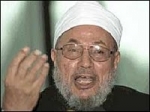24 February 2010
Al-Qaradawi to BBC: "Freedom Is Produced by the Application of the Shari'ah"
 This is from a BBC interview with Shaykh al-Qaradawi, which was published on BBC Arabic on 6 Feb, entitled
This is from a BBC interview with Shaykh al-Qaradawi, which was published on BBC Arabic on 6 Feb, entitled
entitled "Al-Qaradawi to BBC: Freedom Is Produced by the Application of the Shari'ah." I saw bits and pieces of this translated to English on other news sites, but I never found the entire article, so here you go. I found the last two paragraphs to be the most interesting, where on one hand he compares the lack of freedom of religion in the Hijaz to the fact that the Vatican doesn't allow proselyting in its territory, but then on the other hand he goes on to say that there should be no proselyting of other faiths at all among Muslims. So why even waste the time with the Vatican comparison, if there's no freedom of religion in Islam at all?
The president of the International Union of Muslim Scholars Yousuf al-Qaradawi said that his opposition to building the wall (i.e. the wall between Egypt and Gaza) is rooted in his application of the principle of fiqh which prohibits the doing of something halal (permissible) when its end result is haram (forbidden).
Al-Qaradawi, in a meeting held with his colleague Hassan Mouawad aired on the BBC television program "At the Heart Of", added that the issue of building the steel wall between Egypt and the Gaza Strip is not just connected to Egypt's national security. He explained that Egypt also has an Arab and Islamic responsibility to defend the Gaza Strip, which it governed for a time, confirming that he does not want Egypt to withdraw from its Arab, national, and Islamic role.
Concerning the controversy which was caused after he called for the stoning of Palestinian President Mahmoud Abbas, al-Qaradawi said that he was responding to a question about his opinion on "Abbas's invitation to the Israelis to raid Gaza," which occurred several months ago and was brought up recently by Abbas.
He clarified that his response was predicated on Abbas's remarks, and that it was not simply to rule that Abbas should be executed, but that he specifically should be stoned. For he is the president of all of Palestine, and "the president that calls for his own people to be attacked is not worthy to live, but must be stoned by his people."
Al-Qaradawi also responded to a question about the distribution of posters in the West Bank which showed him shaking hands with rabbis, saying that he does not deny the fact, for "the Jews are People of the Book, and we recognize them together with the Nazarenes (i.e. Christians)."
He added that he welcomes the Jews that stand against Zionism, but he is against dealing with Jewish rabbis if they are Israelis, for he rejects all Jews that accept Israel. On that vein, he refused to attended a Jewish-Christian-Islamic dialogue forum because he does not accept sitting on the same stage with Jews that recognize Israel.
"A Necessary Act"
Regarding suicide operations which some Palestinian factions have carried out, al-Qaradawi said that he sees them as a necessary act. He added that this is necessary because the Palestinians are unable to obtain effective weapons. He indicated that those that carried out these operations were trying to target Israeli soldiers and not civilians. However, concerning the suicide operations carried out in public markets, his response was that "they (i.e. the suicide bombers) are not flawless, and they may make mistakes."
The president of the International Union of Muslim Scholars said that he has evidence of what he describes as Shi'a raids. Al-Qaradawi explained that the Shi'a have not complied with what they agreed to in meetings between "leaders of the two sects" (i.e. Sunni and Shi'a) to not attempt to propagate their doctrine in a land that is purely of the other sect (i.e. Shi'a and Sunni leaders apparently agreed to not preach their doctrines in countries controlled by the other sect).
However, he confirmed that he sees no contradiction in this position and his invitation to get together with them, "for we call for a coming together with other religions, both those of the Book and those not of the Book, so therefore how can we not extend this same invitation to Muslims in whom we see some 'innovation' (i.e. Islamic term referring to apostasy)."
Regarding the contradiction between his call to support Hezbollah and his description of its general secretary Hassan Nasrallah as a Shi'a extremist, al-Qaradawi said that it was a response to "Nasrallah's failure to respond to the attacks on al-Qaradawi from the Shi'ites," when he accused them of not fulfilling their agreement in the reconciliation forums "Between the Two Sects." However, he acknowledged that Nasrallah was not among those extremists.
On issues of freedom, al-Qaradawi said that he does not see a contradiction between his faith in freedom of belief and religion, and his rejection of building (non-Muslim) churches in the Hijaz, "For the Hijaz is Islamic private property, and this property cannot be violated, just as mosques cannot be built in the Vatican."
He also confirmed that there is no contradication, in his opinion, between his faith that "freedom is produced by the application of the shari'ah," and his rejection of any proselytizing of other religions among Muslims, "and this should be the position of every Muslim." However, he does not oppose the conversion of a Muslim to another religion, but only after his being called to repent.
11:20 Posted in Egypt | Permalink | Comments (0) | ![]() Facebook |
Facebook |



















The comments are closed.